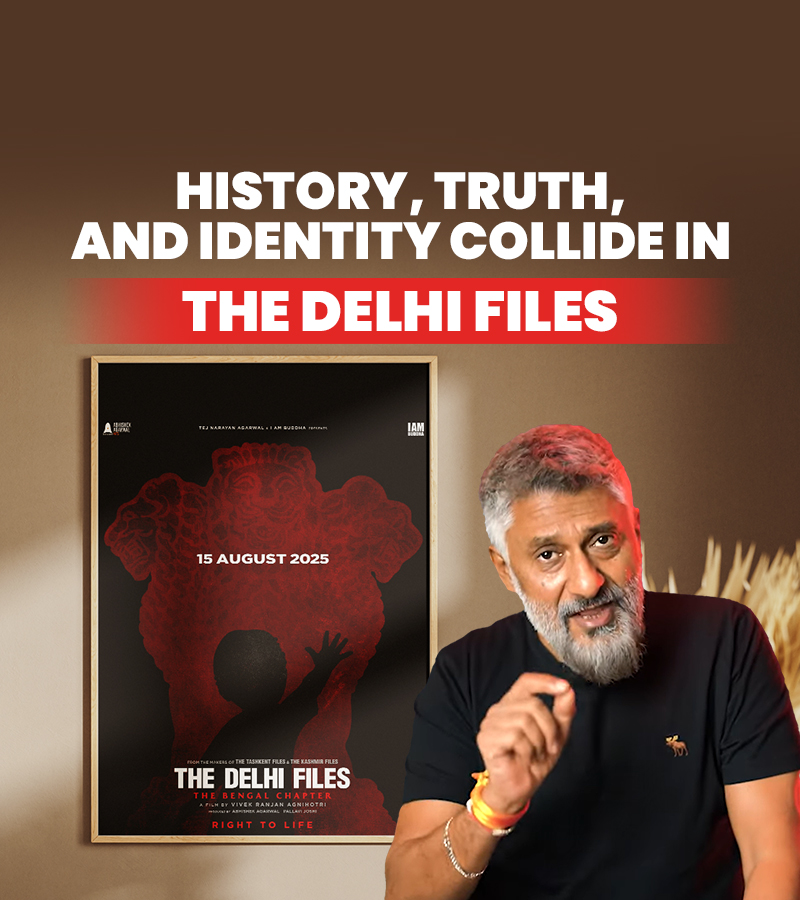

What The Delhi Files Can Teach Us About National Identity
Vivek Agnihotri, Mithun Chakraborty, and Namashi Chakraborty unravel untold truths and redefine what national identity means today.
Delhi has always been the epicentre of India’s monumental journey toward independence and beyond. As the nation’s political heartbeat where the past echoes in the alleyways, the city has been a silent witness to events that have determined India’s present and future.
Vivek Ranjan Agnihotri’s latest offering, The Delhi Files, concludes his Files trilogy and delves deep into the essence of these significant moments. The nuanced account presents the audience with a gripping exploration of Delhi’s political and cultural influence on India’s history.
Explaining the film’s intent, he says, “This film is about connecting hearts and reflecting on the truth. Delhi has always been central to shaping India’s destiny, but many truths remain buried. We wanted to bring those stories to light.”
The Capital of Change
Delhi has stood centre stage in some of India’s most consequential political decisions. From the turbulent events leading to Partition to its modern role as a hub of political activism, the city has seen it all. Mithun Chakraborty, who plays a pivotal role in the film, remarks, “In The Delhi Files, I am the conscience of society. Through this character, we wanted to show the societal voices that often go unheard in the corridors of power.”
Chakraborty also praises the meticulous research behind the film. “Vivek’s storytelling is rooted in deep research. He doesn’t just present facts; he brings them alive in a way that forces you to think. This film is an eye-opener, even for those who are living in today’s times.”
Looking at the Past to Reflect on the Present
One of the film’s strengths is its ability to use historical events to mirror contemporary issues. Namashi Chakraborty, who takes on a serious role in the movie, shares his experience working with Agnihotri. “I couldn’t believe that Vivek sir gave me such an intense role, but it was his conviction that I could pull it off. The film’s back-and-forth storytelling between eras makes it incredibly powerful.”
The father-son duo of Mithun and Namashi Chakraborty bring a unique dynamic to the film, with both actors representing the perspectives of contrasting generations. As Mithun explains, “The reactions to truth and lies are different. The truth may silence people or provoke them to speak up, but lies only breed propaganda. This film challenges audiences to confront the truth.”
Why The Delhi Files Matters Today
At its core, The Delhi Files is a film that reminds us of the importance of understanding our history and questioning our past. Agnihotri emphasises, “If you stop the film, the truth won’t stop. This is not just about the past; it’s about the future and how we perceive our identity as a nation.”
The film invites viewers to reflect on Delhi’s role in shaping India’s political and social landscape and asks appropriate questions about identity, liberality, and unity. By bringing together voices from different eras, The Delhi Files creates a compelling chronicle that will resonate deeply with contemporary audiences. As Chakraborty succinctly puts forth, “This is a film for everyone who cares about India. It’s not just entertainment—it’s a call to remember, reflect, and learn.”
Whether you’re a history fanatic or simply curious about Delhi’s indelible impact on India, The Delhi Files promises to be a cinematic journey worth taking—one that bridges the past and the present, urging us to forge a better future.






